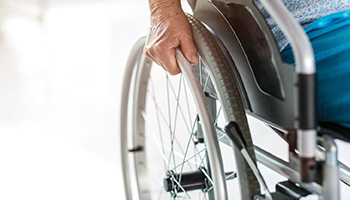Help lead the way for your patients transitioning out of the hospital

It’s an alarming reality. Despite a decade of efforts to decrease readmissions, patient rehospitalization remains a huge challenge that not only impacts healthy outcomes, but also comes at a staggering cost to the American public – more than $15 billion per year, according to the federal Medicare Payment Advisory Commission.1 Nearly 27% of readmissions are considered preventable2 and represent a major setback for the patient. Improving post-discharge transition of care is an opportunity to lower health care costs, improve quality, and increase patient satisfaction all at once.
The top reasons for early rehospitalization
- Inadequate arrangements for post-discharge care
- Medication errors
- Failure to arrange necessary equipment
- Failure to relay important information to outpatient health care professionals
- Lack of discussions about care goals among patients with serious illnesses (e.g., palliative care/hospice)
- Inability by patients to keep appointments after discharge
What CDPHP is doing
To address this critical issue and improve outcomes for our members, the innovative CDPHP Hospital to Home program has a dedicated case management team to assist patients during this important time of need as they transition out of the hospital. If your patient needs to access these services, please have them call the CDPHP Single Source Referral Line at 1-888-94-CDPHP (23747).
We are also working with hospitals to improve transitions of care through our updated readmission policy.
What you can do
- Telehealth. Patient access is a growing issue, due to many factors: Staffing challenges in health care are well-known, office staff may have difficulty finding availability with providers to meet patients’ schedules, and many patients may struggle with transportation to and from appointments after their hospital discharge. This is where telehealth has proved very beneficial. While some patients may prefer in-person appointments, telehealth visits offer an interim solution to help you effectively see patients within the first few weeks after discharge.
- Point person. Another solution may be to designate a specific day and/or provider in your office to handle transitions of care management. This can help eliminate confusion or duplicate efforts and will prioritize services to ensure patients are getting the care they need post discharge. A designated leader in the office managing transitions of care cases can also be the point person for communication between hospitals and other health care systems.
- Patient directives. A hospital admission may be a sign that a patient is dealing with complex medical issues. This may be a good time to revisit advanced directives and consider palliative care or hospice referrals, when appropriate.
- CDPHP case management. If your patient is having difficulty coordinating or getting to their appointments, filling new prescriptions, or are dealing with new diagnoses which require education and assistance – please consider a referral to CDPHP case management. Contact the CDPHP Single Source Referral line at 1-888-94-CDPHP (23747) for assistance.
Thank you for leading the way
Despite the difficulties of managing transitions of care after a hospital discharge, and the barriers that your patients may face, it’s in everyone’s best interests for you to lead the way in helping your patients transition out of the hospital and into the continuing care they need. Thank you for your current and future efforts to facilitate this important post-discharge care.
CDPHP is ready to assist you with the tools and a dedicated team to help. For more for information on transitions of care, contact the CDPHP Quality Department at quality1@cdphp.com.
- https://www.ncbi.nlm.nih.gov/pmc/articles/PMC3802532/
- JAMA Intern Med. 2016;176(4):484-493. Doi:10.1001/jamainternmed.2015.7863
 The Daily Dose
The Daily Dose
Comments are closed.